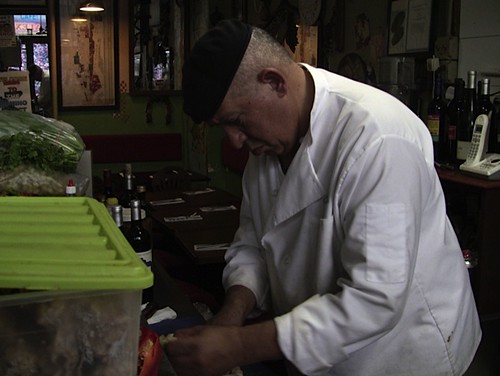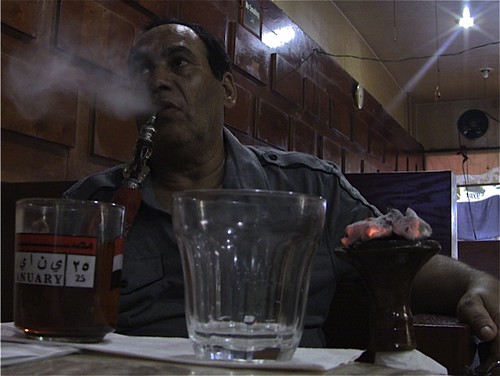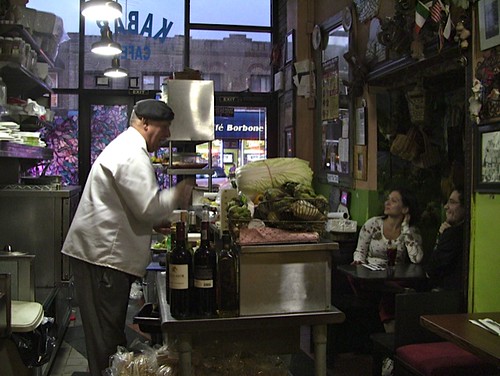There was nothing Egyptian about the two-block stretch in Astoria, popularly known today as Little Egypt, before Ali El Sayed opened Kabab Café in 1989. At that time, it stood out with its Arabic writing on the window, in a neighborhood that was predominantly American, Greek and Italian. Instead of ham and cheese sandwiches or espresso, Mr. El Sayed served falafel and shisha, the Egyptian term for hookah.
“It was about introducing a service to the community, even if this community was only 50 people,” Mr. El Sayed said, noting that there was no sizable Arab population there when he first started his business. “Today this community has grown to thousands and this is the center.”
Kabab Café is a cozy 800-square-foot restaurant, with an open kitchen and eight small tables for two. Mr. El Sayed, 61, prepares and serves the food himself. His restaurant receives 5-star ratings in New York food reviews and enjoys a diverse clientele. When he first started, however, all he sought was a manageable space and affordable rent, which he found in Astoria. In 1989, he paid $900 a month.
“There were no other restaurants around, I didn’t know if it was going to succeed so I really wanted to make it very simple,” Mr. El Sayed recalls. “A little fava beans to satisfy the homesick.”
As it turned out, Mr. El Sayed’s fava beans were not nearly enough but his idea planted the seed for many of the businesses that followed. Labib Salama, 57, owns the shisha lounge right across the street from Kabab Café. He was 27 years old when he first immigrated to the United States. He washed dishes, worked as a busboy, bellman and chef, drove a taxi and opened a car repair shop before sparking the shisha lounge craze on Steinway Street.
Feeling homesick after returning from a visit to Egypt in 1996, Mr. Salama went to Kabab Café, the only place where he could get a shisha in Astoria – possibly in the whole of New York – at the time. Mr. El Sayed, who now offered more than falafel and knew the history of every Egyptian dish he served, was becoming increasingly frustrated by Arab customers who were reluctant to spend money on a quality meal but would occupy a table for hours smoking shisha. He told Mr. Salama that he would only serve him a shisha if he had dinner.
“I wasn’t going to pay all that money to smoke a shisha so I decided to open up a shisha lounge and sit for as long as I want and have it for free,” Mr. Salama said, recalling the incident with a mischievous smirk. “As I turned to leave, I looked across the street and saw a place for rent so I took it.”
Mr. Salama opened his Layali El Helmeya café, named after a popular Cairo neighborhood, in 1996. In the beginning, he says, he made no more than $30 a day. But as more people learned about it, the shisha house became jam-packed with Egyptians who were able to come together over a shisha after a long day’s work for only $3. According to his own estimates, after six months, Mr. Salama was making close to $2000 in profit every night. With this much traffic, one of his employees ventured out and opened a second shisha lounge 500 feet down the street in 1999. The domino effect took hold and the entire block underwent a massive transformation with dozens of Arab-owned shisha lounges, restaurants, delis, halal meat grocery stores, pharmacies, clinics and attorney offices mushrooming side by side on a strip less than half a mile long between 28th Avenue and Astoria Boulevard. And it all started with Mr. El Sayed.
“Ali put that seed there and it grew to a much bigger thing,” said Mohsen Badran, now CEO of an American nonprofit who started working in Astoria in 1989, and lived there from 1992 until 2000. “What he did for Little Egypt is like what Christopher Columbus did for America,” Mr. Badran said.
It is difficult to measure the size and growth of the Egyptian population in Astoria because much of the immigration and community-specific data has been developed in the last 10 years and data from the most recent 2010 census has not been examined in detail yet. But there are at least 40 Arab-owned businesses on the main artery in Little Egypt today compared to the days when Kabab Café stood alone.
“It was like a magnet that started to attract people,” admits Mr. El Sayed about the effect that his 24-hour restaurant had on the block, which long-time residents say had traditionally always been dead by 5 pm. “Ethnic groups always like to be together for the language, the food and the culture.”
For this reason, Mr. El Sayed is not surprised by the way in which the neighborhood evolved. He is, however, disappointed.
He snubs the majority of Egyptian immigrants who arrived in Astoria over the last two decades as lacking the sophistication to take pride in the cultural diversity of their food. In a classic act of irony, just as Little Egypt was coming to fruition in the early 2000s, Mr. El Sayed stopped serving shisha and took down the Arabic writing on his storefront.
“They want a huge plate of rice and okra, but I am trying to make our food international,” he explains. “It takes generations for immigrants to change their attitudes, discover the power of individuality and try asparagus.”
Mr. El Sayed is not arrogant, but he does take his food seriously. He came to the United States 33 years ago to escape Egypt’s authoritarian political system. Upon arriving here, he was trained and worked as a chef and attended a four-month program at the Culinary Institute of America. Through food, he revisits history and gives expression to Egypt’s culture in the West.
Mr. El Sayed can trace koshary, a popular Egyptian dish, back to its Indian roots and explain how it found its way to Egypt through British colonialism. He talks about the “holy grail” of Egyptian sauces, known as tasfira, and how it was later adopted in Spain as sofrito. Paella, he notes, comes from an Arabic word that means leftovers. When he travels to Egypt, Mr. El Sayed says, he visits ancient tombs to see what kinds of fruits and vegetables the Pharaohs drew on the walls and how they slaughtered their animals. He does not present his customers with a menu and prefers to surprise them with different Egyptian recipes. They can watch him make them.
By shifting his business model from one that relies on attracting a particular group of immigrants to one that relies on attracting those simply interested in the culinary experience he has to offer, Mr. El Sayed believes he can survive the cyclical changes neighborhoods undergo as generations of immigrants come and go.
“The décor and the food started to change because I started to serve New York,” Mr. El Sayed said, explaining how his restaurant was able to evolve over time. “Any place that is targeting Middle Easterners alone will close tomorrow.” He may be right.
Just across the street, on Friday, Mr. Salama was busy negotiating a deal to install new sofas in his shisha house. With the proliferation of competing businesses fighting over the same limited pool of customers at a time of general economic downturn, his profits have taken a steep decline, he admits. If this facelift does not help regenerate business, Mr. Salama said, he will consider shutting the place down.
Mr. El Sayed, on the other hand, was busy marinating meats and chopping vegetables when David Leventhal and Eleni Koutsouradis walked in. It was not their first time in Kabab Café. What will you make for us, they demanded.
“How about brain pane with some Egyptian hocus pocus,” Mr. El Sayed said.
“Oh, I love your brain!” Mr. Leventhal, 34, playfully replied.



